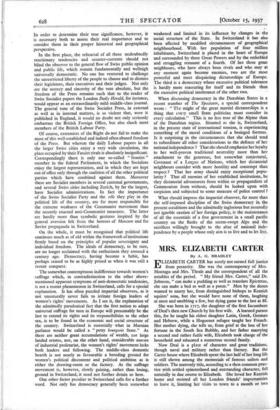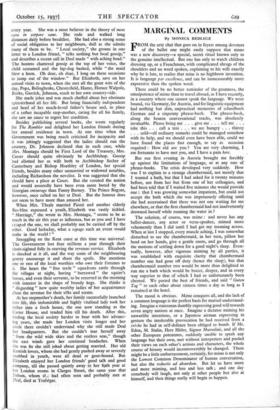MRS. ELIZABETH CARTER
By A. G. BRADLEY
ELIZABETH CARTER has surely not earned full justice from posterity. She was the contemporary of Mrs. Montagu and Mrs. Thrale and the correspondent of all the notables of the period. "My friend Mrs. Carter," said Dr.
Johnson, "can make a pudding as well as translate Epictetus, she can make a bed as well as a poem." Men by the dozen wanted to marry her, from distinguished bishops to Kentish squires' sons, but she would have none of them, laughing at most and snubbing a few, but dying game to the last at 88.
She was born in 1717, the daughter of the first Incumbent of Deal's then new Church by his first wife. A learned parson this, for he taught his eldest daughter Latin, Greek, German and Hebrew, while a Huguenot refugee taught her French. Her mother dying, she tells us, from grief at the loss of her fortune in the South Sea Bubble, and her father marrying a second and rather futile wife, Elizabeth took charge of the household and educated a numerous second family.
Now Deal is a place of character and great traditions, though naval and military rather than literary. But the Carter house where Elizabeth spent the last half of her long life is still shown among the memorials of famous sailors and soldiers. The matronly title, according to a then common prac- tice with settled spinsterhood and outstanding character, fell naturally in due course to Elizabeth. She loved her Kentish home and resisted all her London friends' importunities to leave it, limiting her visits to town to a month or two every year. She was a stout believer in the theory of mens sana in cmpore sano. She rode and walked • long distances daily before breakfast. She had also a strong sense of social obligation to her neighbours, dull as she -admits many of them to be. "Local society," she groans in one letter to a London friend, "talks nothing but local gossip," and describes a recent call in Deal made " with aching head:" The hostess chattered gossip at the top of her• voice, the child -screamed and the lap-dog barked, while "the maid blew a horn. Oh dear, oh dear, I long on these occasions to jump out of the window." • But Elizabeth, save on her annual visits to town, when she met all the great wits of the day, Pope) Bolingbroke, Chesterfield, Hume, Horace Walpole, Burke, Garrick, Johnson, stuck to her own country-side.
She made jokes and was much chaffed about her obstinate spinsterhood all her life. But being financially independent and head .of her much-loved father's house. and, in place of a rather incapable step-mother, caring for all his family, she saw no cause to regret her condition. Besides publishing several books, she wrote regularly for The .Rambler and delighted her London friends during her annual residence in town. At one time when the Government was being much criticised for incapacity and it was jokingly suggested that the ladies should run the country, Dr. Johnson. -declared that in such case, while Mrs. Montagu should be First Lord. of the Treasury, Mrs. Carter should quite obviously be Archbishop. Gossip had allotted her as wife both to Archbishop Seeker of .Canterbury and Bishop Hoathley of London, her special friends, besides many other unmarried or widowed notables, including Richardson the novelist. It was suggested that she should have a place at Court. But she scouted the notion and would assuredly have been even more bored by the Georgian entourage than Fanny Burney. The Prince Regent, however, once called on her at Deal. , But the honour does not seem to have more than amused her.
When Mrs. Thrale married Piozzi and another elderly Bas-bleu espoused a youth, Elizabeth was vastly tickled. "Marriage," she wrote to Mrs. Montagu, "seems to be as much in the air this year as influenza, but as you and I have s cap ecl the one, we shall probably not be carried off by the other. Good lackaday, what a tapage such an event would make in the World ! " • Smuggling on the Kent coast at this time was universal. The Government lost four millions a year through their shott=sighted folly in starving the revenue service. Elizabeth is shocked at it all, and the way some of the neighbouring gentry encourage it and share the spoils. She mentions one or two of the local 'worthies who owe their fortunes to it. She hears the "free trade" squadrons rattle through the' villages at night, having " borroWed " the squire's horses, and even their servants, tube returned in the morning with interest • in the shape of brandy kegs. She thinks it " disgusting " how quite Wealthy ladies of her acquaintance cheat the revenue for their silks and scents.
At her stepmother's death, her family successfully launched into life, this indomitable and 'highly vitalised lady took her father into a fresh house, the one now standing as the Carter House, and tended' him till his death. After this, - finding the local society harder to bear with her advanc- ing years, she made her London visits longer and 'her circle there couldn't understand why she still made Deal her headquarters. But she couldn't tear herself away from the wild wide skies • and the restless seas," though the east winds gave her continual 'headaches. When she was 8o she still joked about getting married. Her old Kentish lovers, whom she had gently pushed away or severely snubbed in youth, were all dead or gout-bound. 'But Elizabeth enjoyed her London friends' good talk and good company, till she passed quietly away in her 89th year at her London rooms in Clarges Street, the same year that Nelson, whom had often seen -and probably met at Deal, died at Trafalgar.























































 Previous page
Previous page